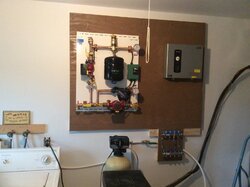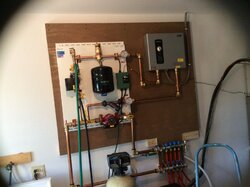Hello, I'm new here...looking for info on heated floor systems or thread for that subject, thanks,
Heated floors
- Thread starter furpy
- Start date
-
Active since 1995, Hearth.com is THE place on the internet for free information and advice about wood stoves, pellet stoves and other energy saving equipment.
We strive to provide opinions, articles, discussions and history related to Hearth Products and in a more general sense, energy issues.
We promote the EFFICIENT, RESPONSIBLE, CLEAN and SAFE use of all fuels, whether renewable or fossil.
You are using an out of date browser. It may not display this or other websites correctly.
You should upgrade or use an alternative browser.
You should upgrade or use an alternative browser.
- Status
- Not open for further replies.
Bad LP
Minister of Fire
I purchased a hydro smart system at menards and filled it yesterday.....ok, had plenty of questions, but all were answered by friends and through someone that installs them (he is referred to me from menards). Well all went well u till I ran the system....air started to accumulate and the micro boiler shut down because of flow......I entered more fluid until air gone.....then heard sounds I did not like......looked under bath tub where I had previously jack hammered the hole in floor for more room for the tub drain.....found damaged tube of pex O2 .....long story....house was flooded in 2013.... Slab on grade......insurance paid for raising house above flood plain.....installed tubes while pouring new floor( was talked into it by contractor) paid out of my pocket......took two years to finish rest of heated floors( did all myself to save money).... I think the pex can be spliced by a good plumber.....then I will try again to purge air and run that baby!.....I will still have many questions though.....for one, I'm using sump pump instead of transfer pump....that said no sump pump, but I was told it would be fine.....could not get pressure more than 12 psi, but with leak, no wonder...And thanks for the reply!What do you want to know about them?
Attachments
Karl_northwind
Minister of Fire
you probably didn't get all the air out of those floor loops. it'll take some time and opening them one at a time, then all together.
piping looks OK. the sump pump will not push more than 12 PSI usually, as that equates to 27 feet of lift. a 1/2hp transfer pump will usually run easily to 35 PSI (and pop the pressure relief) but will move air out much more readily at 20 PSI. Patience and pressure. your friends in air elimination.
karl
piping looks OK. the sump pump will not push more than 12 PSI usually, as that equates to 27 feet of lift. a 1/2hp transfer pump will usually run easily to 35 PSI (and pop the pressure relief) but will move air out much more readily at 20 PSI. Patience and pressure. your friends in air elimination.
karl
Hey Carl, thanks for the reply.....I found out why I lost pressure....looked behind bath tub where the drain goes into cement floor....the pex is exposed there and it was damaged .....probably when plumber cut the excess off and hit it with saws all....I had to jack hammer hole bigger to expose more pex....hired plumber to splice...did not want to take chance here....been 3 days....still waiting for plumber....must have patience....then was told by plumber to use city pressure after I fill to get the psi up to 15 lbs....very carefully....but when I unhook the pump to re hook city, will I add air?
Karl_northwind
Minister of Fire
there are tricks, like purging the air out of all your hoses and putting the fittings on loosely at the heating connection, and turning on the tap slightly to remove all (most) air. I do that sort of thing when I have to add antifreeze to an existing system. it's a pain, and a little messy, but worth it to not have to bleed air out of the system again.
karl
karl
leon
Minister of Fire
Hey Carl, thanks for the reply.....I found out why I lost pressure....looked behind bath tub where the drain goes into cement floor....the pex is exposed there and it was damaged .....probably when plumber cut the excess off and hit it with saws all....I had to jack hammer hole bigger to expose more pex....hired plumber to splice...did not want to take chance here....been 3 days....still waiting for plumber....must have patience....then was told by plumber to use city pressure after I fill to get the psi up to 15 lbs....very carefully....but when I unhook the pump to re hook city, will I add air?
========================================================================================================
OK now:
Is there a shut off valve for each loop to separate it from the heating system?????
What you do is shut the other loops off completely and then you can power purge the
air from the loop into the boiler then out.
Your plumber took shortcuts by not installing boiler drains and shut off valves to each and every loop

Adding a shut off valve on one side of the manifold and a boiler drain to every loop on the delivery side also allows you to push all the air out with a garden hose connected to a laundry tub faucet with a drain hose going into a bucket or floor drain.
The more I see of baseboard or in floor heating the less I like it as to many short cuts are taken.
I think about the copper in floor heating systems installed in the levittown housing tracts on Long Island and in Pa., and just cringe. Smart plumbers found the leaks in the floors by putting cats in the rooms and when the cat laid down to get warm that is where they found where the leaks were.
I am so glad that I will getting rid of my rats nest of plumbing and installing my dual fuel coal stoker.
One pipe steam or gravity hot water heat is so much easier.
Last edited:
Karl_northwind
Minister of Fire
Yes Leon....there is shut off for each of the 4 loops.....I purge one at a time by turning on the pump and watching for air bubbles coming out of bucket, when they stop....I close outlet valve first....wait for pressure to get 15psi, then shut inlet valve....then start on next loop until all loops purged....if not enough pressure, ( been told to raise sump pump high in air so it can achieve more pressure), then I will attemp to use city pressure with Karl's idea of making sure there is no air in the fill hose and keep fitting loose , let some water leak out then tighten.....carefully turn on spigot until 15 psi, then shut valve....will try this week end....by the way, my plumber told me he had propylene glycol and I could buy some....I went to get 5 gallons.....found out he wants the 30 $ a gal!.....I can get at menards for 16$ a gallon! Same stuff full strength. And thanks Karl and Leon for the info!
flyingcow
Minister of Fire
Flying cow.....thanks for the reply.....I live in the Midwest and it gets cold here...sometimes 10 below zero....if we have a power outage, there is a danger of the fluid in the floor freezing and if that happens, well, let's hope not.....I am new to the heated floor family and have many questions like what temp to set the micro boiler at.....right now it is set at about 100 degrees. When they laid the tubing, I'm not sure where each loop is located....did not document, but took picture with cell phone....will try to get that pic blown up sometime....need to learn how to regulate temp in each loop. What rooms to heat more or less....the thermostat is designed for heated floors and is also something I need to understand more....I have forced heat furnace also for back up, but don't want the systems to fight each other...
maple1
Minister of Fire
This floor is in your house?
If it gets cold enough in there that the floor freezes, you will have bigger problems to contend with, like all of your busted plumbing & who knows what else.
Usually glycol in floors is done in places with a real threat of freezing - like a garage that may see periods where it won't be heated & internal temps are expected to be below zero occasionally. It takes a long time to get a slab up to temp with in-floor heat, and also would take a long time for it to coll enough to freeze the pipes in it.
If it gets cold enough in there that the floor freezes, you will have bigger problems to contend with, like all of your busted plumbing & who knows what else.
Usually glycol in floors is done in places with a real threat of freezing - like a garage that may see periods where it won't be heated & internal temps are expected to be below zero occasionally. It takes a long time to get a slab up to temp with in-floor heat, and also would take a long time for it to coll enough to freeze the pipes in it.
System up and running....temp on micro boiler set at 105 degrees....pressure is at 30 psi on lower gauge and 20 psi on upper gauge .....thermostat runs in 20 minute cycles....no air in system....I think it's going to be fine....slab on grade house....1200 sq ft.....so far so good....thanks for all of the input from all of you....this is hydro smart system I bought at menards....happy so far. Any body else here use the hydro smart?
flyingcow
Minister of Fire
This floor is in your house?
If it gets cold enough in there that the floor freezes, you will have bigger problems to contend with, like all of your busted plumbing & who knows what else.
Usually glycol in floors is done in places with a real threat of freezing - like a garage that may see periods where it won't be heated & internal temps are expected to be below zero occasionally. It takes a long time to get a slab up to temp with in-floor heat, and also would take a long time for it to coll enough to freeze the pipes in it.
+1
- Status
- Not open for further replies.
Similar threads
- Replies
- 19
- Views
- 760
- Replies
- 6
- Views
- 783
- Replies
- 13
- Views
- 920
- Replies
- 15
- Views
- 633



